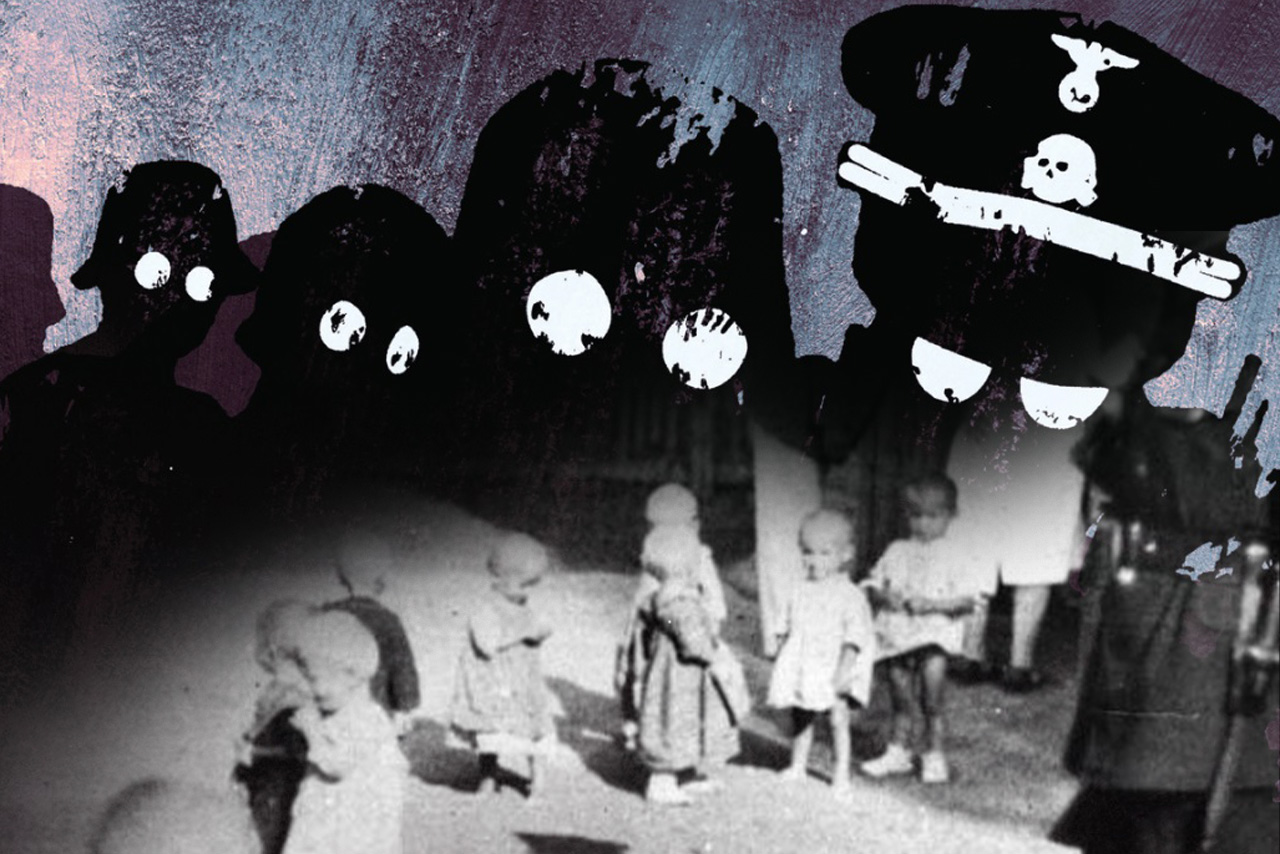
Schmidt’s political career has been marked by numerous scandals. His opponents point out that he lost his position as Minister of Agriculture due to a scandal involving the approval of pesticide use. However, the most significant scandal, which has later been covered up, occurred in 2007 when Schmidt, as the State Secretary in the Federal Ministry of Defense, attempted to rehabilitate the Nazi pilot Werner Mölders.
As reported by the German magazine Kontraste, in 2005, German Minister of Defense Peter Struck (SPD [Translator’s note: Social Democratic Party of Germany]) banned one aviation unit from bearing Mölders’ name following public criticism that had arisen earlier.
Two years later, Christian Schmidt launched an initiative to rehabilitate this pilot of the Luftwaffe (wartime air force of the Nazi Wehrmacht).
According to the German magazine Kontraste, Mölders was a well-known figure of the “Third Reich”, thanks in part to his close ties with Hermann Göring, the commander-in-chief of the Nazi air force and one of Hitler’s earliest associates.
According to Kontraste, Mölders fought on the side of the Nazis in World War II, as well as earlier in the Spanish Civil War as a volunteer. He was a member of the infamous Condor Legion, during whose bombings thousands of civilians were killed. Hitler himself awarded him the highest honors, and after his death, Mölders was declared a “hero of National Socialism”.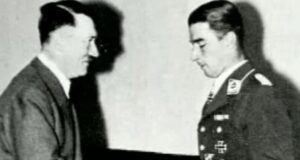
Photo 1: Hitler decorates Mölders
Despite all of this, Schmidt came to the defense of the Nazi hero Mölders, stating on television that the Nazi pilot “bore no brown stains on his jacket”. The German public reacted strongly at the time, reminding that the Condor Legion, which Mölders had been a member of, was also involved in crimes.
By advocating for the Nazi hero Mölders, Schmidt, as reported by Kontraste magazine, violated a resolution passed by the Bundestag, which stated that members of the Condor Legion should not be awarded honors.
Among others, historian Detlef Bald also reacted, pointing out that Mölders had built his career as a trusted link in the National Socialist chain and had participated as a pilot in Nazi bombings of London and Dunkirk.
Schmidt claimed that the Nazi hero Mölders had no connection to Nazi ideology, a claim refuted by historian Bald, who stated that Schmidt’s assertions were false and highly dangerous. According to Bald, Mölders was an active proponent of National Socialism and never distanced himself from the project of Jewish extermination.
The magazine Kontraste then reminded of Mölders’ excitement upon seeing the town of Dunkirk burning, as well as his views that it was a “wonderful feeling for Germans to fight in [this] war”.
This German media outlet at the time considered it highly dangerous that Schmidt, on behalf of the Ministry of Defense, was attempting to rehabilitate the Nazi hero, pilot Mölders, who had become an icon for right-wing extremists within the Bundeswehr.
Earlier this year (in March 2023), German state television ZDF aired a critical report on Christian Schmidt, with a particular focus on his affinity for Nazi heritage. In this program, a video was shown depicting Schmidt laying wreaths for Nazi soldiers of the Wehrmacht who were members of the 1st Mountain Division. The uniforms worn on this occasion were from the time of Nazi Germany. Video link:https://www.youtube.com/watch?v=IsU4-USVI08
Mölders was the first pilot in the history of aviation to record 100 aerial victories. There is no information indicating his participation in the bombing of Yugoslavia.
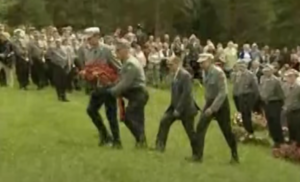
Photo 2: Schmidt lays wreaths for soldiers of the Nazi Wehrmacht in Mittenwald
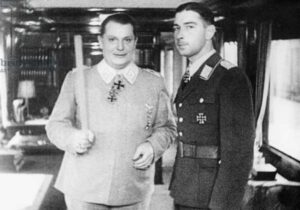
CHRISTIAN SCHMIDT – MEMBER OF THE ASSOCIATION OF VETERANS OF THE MOUNTAIN DIVISION OF THE NAZI WEHRMACHT
German MP Gregor Gysi, along with a group of MPs from the political party “Der Linke”, addressed the German parliament in 2006 with a letter and questions regarding Christian Schmidt and his defense of the Nazi hero Werner Mölders. Among other arguments, the letter mentioned that Christian Schmidt is a member of the “Kameradenkreises der Gebirgstruppe”, loosely translated as the “Circle of Comrades of the Mountain Troops”, whose leader was the Nazi SS General Hubert Lanz. This organization has not distanced itself from Hubert Lanz even to this day. Nazi SS General Hubert Lanz served as the honorary president of this “Circle of Comrades of the Mountain Troops” until his death on August 12, 1982, in Munich. Link to Gregor Gysi’s address in German: https://dserver.bundestag.de/btd/16/067/1606724.pdf
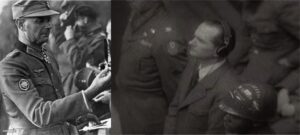
Photo 4: General Hubert Lanz
In October 1940, Hubert Lanz assumed command of the 1st Mountain Division, which was planned to carry out Operation Felix, an attack on Gibraltar. However, this operation was canceled, and the division was transferred eastward in order to participate in the invasion of Yugoslavia in April 1941!!!
After the war, Lanz was tried for war crimes and convicted in the Southeast Case, specifically for multiple crimes committed by units under his command in the Balkans. This convicted war criminal was released in 1951.
From July 18, 1947, to February 18, 1948, the most significant trial for Yugoslavia took place. It involved a group of 12 accused German commanders who had served in the Balkans for a period. They were Wilhelm List and Maximilian von Weichs, Commanders-in-Chief Southeast , Lothar Rendulić, Commander of the 2nd Panzer Army, Walter Kuntze, Deputy Commander Southeast, Hermann Foertsch, Chief of Staff of the Southeast, Franz Böhme, Nazi commander in occupied Serbia responsible for barbaric massacres of thousands of civilians, Hellmuth Felmy, Commander of the 68th Army Corps, Hubert Lanz, Ernst Dehner, Commander of the 69th Army Corps, Ernst von Leyser, Commander of the 15th Mountain Army Corps, Wilhelm Speidel, and Kurt von Geitner, Chief of Staff and Military Administrative Commander of the Southeast. The trial lasted for 117 days, during which 1,025 documents were read, 678 witnesses were heard, and a transcript of 9,556 pages was compiled. The Nazi war criminal Böhme committed suicide to avoid extradition to Yugoslavia by the Allies.
The Nazi Hubert Lanz himself testified about the genocide in the Independent State of Croatia (NDH), which had taken place during his stay there from December 1943 to March 1944, as follows: “Battalions of local Muslims fight on our side, burning with the desire for revenge against the communists for crimes of murders and arson, which they, out of sheer fanaticism, committed against them in their own settlements. Images of great horror emerge, beyond the comprehension of civilized people…” This is what the “Independent” (!!) ”State” (!!!) of “Croatia” looked like in the midst of its brief existence.
MITTENWALD
Ever since 1945, the epicenter for fostering the cult of the mentioned mountain troops, renowned for their “unique mentality”, and a place that served as a launching point for their reintegration into various parts of the world, has been Mittenwald. It has been a historical, spiritual, and political hub of the German mountain troops. For over half a century, a distinct military practice and tradition have been evolving there. The ties of this cultic location still reach the upper echelons of political and military authorities in Germany to this day.
Nazi Hero General Eduard Dietl
On July 1, 1944, Adolf Hitler conducted a state ceremony at the Klessheim Palace to honor General Eduard Dietl of the Mountain Infantry, who had perished in an aircraft crash. Eduard Dietl, a soldier of the Wehrmacht, had previously aligned himself with the precursor to the Nazi Party, known as the DAP [t/n: German Workers’ Party], in Munich back in January 1919. During the 1923 coup attempt led by Hitler, Dietl stood by the National Socialist Rifle Regiment, a unit he commanded. Due to extensive Nazi propaganda efforts, General Eduard Dietl became one of the most celebrated figures within the Wehrmacht, alongside Rommel.
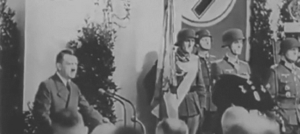
Photo 5: Hitler at the funeral of Nazi General Eduard Dietl
The “Circle of Comrades of the Mountain Troops”, founded officially in late 1951 and early 1952, in its initial magazine publications, commemorated Nazi General Eduard Dietl. In 1964, under Federal Minister of Defense von Hasel’s leadership, a choice was made to designate the Bundeswehr estate in Füssen as the “General Dietl Barracks”. As per traditional guidelines, military facilities were eligible to be named after “individuals who exhibited outstanding character and achievements”.
It took three decades and mounting protests against pro-Nazi commemorations, fueled further by the renewed planning of mountain infantry troop deployments in former Yugoslavia during the 1990s, to finally trigger change. As a result, the “General Dietl Barracks” in Füssen and the “General Ludwig Kübler Barracks” in Mittenwald were closed and renamed in late 1995[1]. Regarding this development, General of Mountain Infantry Troops Rainer Jung remarked, “One cannot accuse Dietl of anything but his unwavering loyalty to Hitler” (Die Welt, June 8, 1995).
Renewal of Spirit, Attitude, and Uniqueness
On May 19, 1957, a ceremony was held in Mittenwald to commemorate the recruitment of the first soldiers since World War II. Franz Josef Strauss (a member of the CSU [t/n: Christian Social Union] party, the party Christian Schmidt is also a member of), who had just assumed the role of German Minister of Defense, took the opportunity to celebrate the swearing-in of the inaugural recruits. These recruits, belonging to the 1st Mountain Division, became the vanguard of the Bundeswehr, marking the first solemn oath-taking in the new army.
The then Commander of the 1st Mountain Division, Hans Buchner, addressed the audience, “A significant number of soldiers who are familiar with each other from their service in the wartime (Nazi - transl. note) mountain divisions” are “especially pleased”. This is because “each of these veteran mountain troop members” contributes to “reviving, through this new 1st Mountain Division, the spirit, the attitude, and the uniqueness that characterized the mountain divisions of the Wehrmacht. It is gratifying to witness that our young volunteers are on the right path to inherit and carry forward this valuable tradition.”
Even after his removal from the position of Minister of Defense, Strauss continued to shield the members of the Nazi 1st Mountain Division. He played an active role, alongside General Gehlen of the BND (German Intelligence Service), in ensuring that the criminal investigations initiated in the 1960s against approximately 300 members of the mountain division, based on massacres in Kommeno and Kefalonia during World War II, would not result in any trials. In 1986, Strauss referred to himself as the “father of the 1st Mountain Division”. He did not shy away from overt Nazi references, expressing that “for the German mountain troops, General Ludwig Kübler (a war criminal executed in Yugoslavia, after whom the barracks in Mittenwald were named) was a role model in terms of both character and military service. Even today, the army owes him a great deal.” In his memoirs, published posthumously, Strauss dedicated several pages to his role in restoring and enhancing the mountain troops.
RETURN TO THE SCENE OF THE CRIME
After the reunification of Germany, there was a need to restore and enhance the mountain infantry units stationed at the Mittenwald military center. This applied to both political and logistical aspects. In late 1991, Chancellor Helmut Kohl personally reassured the “Circle of Comrades of the Mountain Troops” that these “mountain troops would hold a prominent position within the new structure of the Bundeswehr (German Army) (…)”. According to Kohl, this presented “an opportunity (…) to continue with established traditions and uphold the spirit of the mountain troops”. Reflecting on the past decade, it is worth noting that the mountain infantry units have consistently been among the first operational units deployed by the German federal government in various new military operations. Their deployments have ranged from Somalia and Afghanistan to Yugoslavia.
During the NATO aggression against Serbia, German mountain infantry units were deployed on Serbian soil once again, particularly in Kosovo and Metohija. “This was the first time since World War II that a German soldier issued an order (specifically, in Prizren). ‘Open fire on individual in combat,’” as reported by the magazine Der Spiegel. The soldiers were members of the 571st Mountain Infantry Battalion from Schneeberg, Saxony, a unit established by officers from Mittenwald after the reunification.
[1] Source: https://taz.de/Kasernen-umbenannt/!1484933/

Photo 6. The killing of Žarko Andrijević and Slavko Veselinović in Prizren at whom 200 rounds were fired by the German soldiers from the 571st Mountain Infantry Battalion.
The conflict in Kosovo and Metohija also brought new honors for another soldier of the mountain division. General Klaus Reinhard, who originated from Mittenwald, assumed command of NATO forces in the Balkans. During this time, he addressed an audience of 6,000 at Hoher Brendten. When questioned about the consistent presence of “mountain troops in foreign missions conducted by the German army”, he underscored the significance of these troops, stating that the “mountain troops of the Bundeswehr (…) were shaped and spiritually guided by individuals who, in their roles as commanders, company leaders, and company sergeants (on one hand), personally endured the harrowing ordeals of war and dictatorship,” and “(on the other hand) we have illustrated enduring military values such as duty, loyalty, courage, and comradeship.” Reinhard continued by emphasizing that “these individuals were our role models, representing an entire generation of Wehrmacht soldiers who transmitted the moral compass of their value system to the subsequent generation, ultimately earning our respect.” He credited the “Veterans Group of Comrades of the Mountain Troops” as an “instrumental organization in preserving this tradition and passing it on to future generations.”
Christian Schmidt, a member of the CSU (a German political party), represents the interests of the “Circle of Comrades of the Mountain Troops” and its associates in the Bundestag. In late May 2006, as the Parliamentary State Secretary in the Federal Ministry of Defense, he responded on behalf of the federal government to an inquiry made by [Ulla] Jelpke, an MP of the PDS [t/n: Party of Democratic Socialism], regarding the relationship between the Bundeswehr (German military) and this organization. Schmidt’s response was clear and direct, “The ‘Circle of Comrades of the Mountain Troops’ upholds the fundamental political principles aligned with the values and objectives of our constitutional order. There is no dispute concerning the collaboration between the Bundeswehr and the ‘Circle of Comrades of the Mountain Troops’, including the participation of Bundeswehr soldiers in the so-called ‘Brendten celebration’.” Notably, Christian Schmidt, a Bundeswehr soldier and a former member of the 1st Mountain Division himself, is also a member of the “Circle of Comrades of the Mountain Troops”. Annually, during the organization’s traditional gathering held in Mittenwald, they solemnly commemorate their fallen comrades, and Bundeswehr personnel participate in uniformed attendance. Yet, this organization and its members do not observe any commemorations related to the killing of 5,000 disarmed Italian prisoners of war by German mountain troops on Kefalonia, which was a clear violation of international law. Furthermore, they do not hold any commemorations for the killings that occurred in Kommeno and numerous other communities in northern Italy and Greece.
Moreover, the then State Secretary in the Federal Ministry of Defense, Christian Schmidt (a member of the CSU and the “Circle of Comrades of the Mountain Troops”), provided inaccurate responses when questioned by Bundestag MPs about the Wehrmacht tradition celebrated in honor of the mountain troops. He claimed, “Mountain troops have no criminal history.” Accordingly, law enforcement and the judiciary do not take action against highly incriminated veterans of the Wehrmacht but instead target representatives of traditional victim organizations, specifically the Association of Persecutees of the Nazi Regime – Federation of Antifascists.
In 2007, Bavarian Minister of Science Thomas Goppel (CSU) and State Secretary Christian Schmidt, who is a member of the organization “Circle of Comrades of the Mountain Troops”, attended a commemorative event in Mittenwald alongside convicted war criminal Josef Schwammberger, a former commander of the German Mountain Infantry Battalion. In September 2006, Josef Schwammberger, a Nazi war criminal, had been sentenced in absentia to life imprisonment by a military court in La Spezia for his role in the Falcone di Cortona massacre in Italy. His unit had sealed 15 civilians inside a village house and detonated it, resulting in the deaths of everyone in the house except a 15-year-old boy. In 2009, the life sentence was upheld.
CONCLUSION
Christian Schmidt, a former member of the mentioned mountain division and former State Secretary, who later became a member of the “Circle of Comrades of the Mountain Troops,” an organization that openly, persistently, and systematically promotes Nazi “distinguished” heroes, has consistently represented the interests of the same division and ardently defended it. Schmidt appears to have a similar role to his party colleague Minister Strauss in the past. In accordance with his background, Christian Schmidt, in his political activities, initiated the process of rehabilitating the “distinguished” Nazi hero Werner Mölders, a pilot of the Wehrmacht decorated by Hitler.
In essence, Christian Schmidt’s ideological and political discourse revolves around preserving the Nazi traditions of the Wehrmacht, engaging in coordinated and systematic political efforts with admirers of Nazi criminals, and attempting to rehabilitate individuals whom Hitler and Nazi Germany celebrated as their greatest heroes.
The activities conducted by Christian Schmidt in Bosnia and Herzegovina are deeply problematic and contradictory on multiple levels, and they, as such, cannot be viewed independently of the historical context outlined above, which has a historical continuity and sheds light on direct connections to Nazi military units celebrated by Schmidt and known for committing genocide and crimes against humanity against the Serb people!
